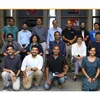A crisis tests foundations of entrepreneurship: how the TiE Young Entrepreneurs program instils creativity and resilience in school students
TiE Bangalore just wrapped up the fourth cohort of its educational program on entrepreneurship for school students. Here’s what the jurors say about its design and contributions.
To teach high school students about starting up their own ventures, the worldwide TiE network has rolled out the TiE Young Entrepreneurs (TYE) program. Over 30 chapters of the TiE entrepreneurship support network around the world have conducted the program. Winning teams will participate in the global finale (see Part I of our coverage of the 2020 round, and earlier article on the 2019 edition).

The TYE program consists of eight sessions on entrepreneurship, followed by mentorship for students to choose a specific business problem and launch a venture to solve it. After city and regional rounds, winning teams compete at the TYE Global Finals for cash prizes up to $10,000 and global recognition.
YourStory participated as a faculty member for the TYE Bangalore Summer 2020 program, and as a juror along with Naganand Doraswamy (Ideaspring Capital), Priya Chetty-Rajagopal (Multiversal), Santhosh SS (), and Vaitheeswaran K (Again Drinks).
“The greatest value TYE offers is the idea development into a viable business plan, with guidance and mentoring by successful entrepreneurs in specific domains. Students benefit a great deal from this,” explains Geetha Ramamurthy, Founder and CEO of GiGa Innovation Centre in Bengaluru and the US, in a chat with YourStory.
TYE was originally started in Boston in 2005 by Geetha, who was Executive Director at TiE Boston at the time. The idea has its roots in the query by her 15-year-old son on what resources were available for him to learn entrepreneurship.
Business ideas
The TYE Bangalore summer batch of 46 students formed eight teams and presented their plans to a five-member jury this past weekend. The assessment criteria were customer validation, execution, iteration, product-market fit, business model, teamwork, presentation, and discussion skills.
Creative ideas were presented by a range of teams: Greenhawk, Deffendo, Cookfluent, WearYouGo, Illuminet, EzFarm, EventCo, and Friska. The jury declared WearYouGo as the winner.

The eight proposals spanned online event assistance, environmentally sustainable products, pet food made from processed food waste, a platform for people to learn how to cook, a platform for organic farmers, a SaaS-based recommendation product for clothing, an online platform to help girls defend themselves from abuse, and an idea-development platform.
Due to the pandemic, all workshop sessions, mentoring, pitching, and jury rounds were conducted online. See also our earlier profiles of resilience activities by TiE Bangalore, TiE Global, TiE Silicon Valley, TiE Pune, TiE Kerala, TiE Hyderabad, and TiE Kolkata.
Entrepreneurship in the pandemic era
“Many entrepreneurial businesses have pivoted to meet new needs for goods or services borne out of the coronavirus crisis. Governments the world over have been repeatedly tested and stretched,” Geetha explains. Governments have set new rules and norms to try to re-establish confidence and give economies a chance of survival.
As finance sources dry up, more than 40 percent of new ventures will fall into the so-called “cash crunch zone” with only sufficient cash for three months or less of normal operations, she adds, citing WEF data.
“On a positive note, the coronavirus crisis is a catalyst for entrepreneurship. Throughout human history, crises have been pivotal in developing our societies,” Geetha emphasises. She illustrates this with examples of how pandemics have helped advance healthcare systems, wars fuelled technological innovations, and the global financial crisis helped companies helped advance tech companies like Paytm, Byju’s, and others in India.
“The present pandemic will arguably not be an exception. Entrepreneurs can be expected to rise to the challenge,” she adds. Businesses help society get through economic crises by creating innovative solutions.

"Many companies are showing responsible citizenship. They are demonstrating an interest in societal wellbeing, and showing that they may need to give up short-term profits for the benefit of society,” Geetha observes. Resourceful companies have come up with creative responses and solutions to tackle emerging challenges with scarce resources.
“In combination, citizenship and resourcefulness can drive socially-aware entrepreneurship. Many firms have initially responded to the crisis not only by cutting costs but by engaging in new entrepreneurial activities,” she adds.
As examples, Geetha cites distilleries in the US, Canada and Australia that started to produce hand sanitisers. Fashion businesses like Zara, H&M, Hedley & Bennett and Trigema are producing PPE, gowns, and other supplies for hospitals; airline crews are also being retained to help in hospitals, she explains.
Geetha refers to a KPMG report on the startup ecosystem in India, according to which the number of startups has grown from 7,000 in 2008 to 50,000 in 2020.
“Some TYE teams are thinking in COVID-19 terms and designing their ideas to meet business and societal needs,” she enthuses.
TYE Bangalore, Summer 2020
The TYE Bangalore Summer 2020 students represented 36 schools from seven cities across India. “The teams shared great ideas, and their approach to go-to-market and growth strategy was quite innovative. We must applaud the efforts by the mentors and their extraordinary emotional and intellectual support,” Geetha says.
Participating schools included Greenwood High, TISB, Christ Junior College, National Public School, Delhi Public School, Bishop Cottons Girls' School, Sophia High School, Mallya Aditi International School, Oakridge International School, Neev Academy, and Sri Kumarans Children's Academy.

Other schools were Allen Integrated, The Amaatra Academy, Daffodil International School, Jyothy Kendriya Vidyalaya, HAL Public School, City International School Kothrud, Utpal Shanghvi Global School, Sreenidhi International School, Sri Chaitanya, Ann Mary School, The Amaatra Academy, and Jamnabai Narsee International School.
There were 250 participants at the online finale, comprising alumni, parents, students, TiE members and Charter Members. TYE students get complimentary TiE membership for one year, and the winning team will contest against the Winter cohort’s winner, to secure a spot in the Global Finals next year. Applications are opening soon for the Winter cohort, which will launch on 25th October.
“At the program level, only one team emerges as a winner. However, in my view, all participants and all teams are winners as they have demonstrated tremendous learning and put in extraordinary effort to build an idea into a viable business plan,” Geetha emphasies.
She recommends a systematic tracking system to monitor progress of TYE student participants worldwide. “This will help understand how they are advancing in their higher education and life and how TYE learning continues to impact them,” she suggests.
TiE Bangalore president Ravi Gururaj suggested that a robust TYE Alum group be created. “It is a great idea. We have initiated the process to connect the TiE Global Alum groups so that the participants worldwide can ‘Connect, Collaborate and Create’ extraordinary companies in the future,” Geetha says.
She also commends the TYE Bangalore team for their extraordinary job on advising and preparing students for the sessions. She herself mentored the teams on how to nail the message on questions like Who We Are, What do our products and services provide, and How are we different from our competitors.

Benefits for students
There are a number of advantages of teaching how to start up at a school age. “Teaching students about entrepreneurship helps prepare them for an uncertain future. The creativity and collaboration involved prepares them for further 21st century education,” Geetha explains.
Students learn problem identification, a skill that will be very useful in tomorrow’s world. “They also learn to develop grit, which translates into passion and sustained persistence. Ultimately, it helps make the world a better place as students learn to create products and services that solve real problems, meet needs, and ease pain points,” Geetha adds.
Learning about entrepreneurship helps imbibe critical life skills such as cultivating curiosity and creativity, teamwork, collaboration, data gathering, and analysis. Students also learn how to solve complex problems that do not have a definitive answer, to use social media as an advocacy tool, and public speaking.
“Every time I participate in the program, it inspires me to no end and gives me immense gratification,” Geetha says with pride. She urges schools to introduce entrepreneurship as an extra-curricular learning to their students. They should permit students to sign up for a private external programme as the school schedule is very tight.
“Parents must understand that entrepreneurship learning complements school learning, and provides value for both career and entrepreneurship paths,” she adds. Once they understand the benefits, parents will be more open to engage their children in entrepreneurship learning.
“This is the best time and opportunity for governments to explore the benefits of entrepreneurship learning,” Geetha advises. They should introduce it as part of the curriculum for Class 8, so that students then get an opportunity to build on these skills in Classes 9 and 10.
She also recommends that corporates and startups invite students to explore and solve their problems through internships and certification. “Both can benefit from innovation in a mutual win-win,” Geetha emphasises.
“Given that the students participate in online learning programs offered in their school, they have adapted quite well to our TYE virtual sessions. TYE is helping create the future generation of successful entrepreneurs and leaders. I am excited to be a part of it,” Geetha says.
“Since the TYE program started in 2005, judging from the innovative ideas presented by students, worldwide, I have come to believe that there are no limitations on the extraordinary research the students conduct and the depth of domain knowledge they acquire on their own,” she emphasies.
She also offers words of advice for the participating students: “Remember to apply the learning wherever your passion takes you in the future, and always keep an open mind to opportunities out there.”

Juror insights
The jurors offered feedback and tips in a chat after the grand finale. “Almost all students were very confident and spoke well about their startup. Presentation skills were of high order, given their profiles,” says Vaitheeswaran K, Co-Founder, Again Drinks.
The students were very sharp and clear when answering questions. But they could have improved business plan steps like marketing and sales approaches, financial plans, and competitive positioning, he adds.
“My message to students is that they are all privileged to be young in a growing country full of opportunities. Unlike previous generations, they need not all become engineers, doctors, lawyers, or chartered accountants unless they want to,” he explains.
Students should simply follow their passions and should pursue their entrepreneurial dreams without any worries and concerns. “Encourage your kids to follow their passions and dreams,” he advises parents.
“If the students want to start up, let them. Parents should stop living their failed dreams through their kids. Don't worry about finding jobs for your kids; help them become job creators,” Vaitheeswaran urges.
He also invites the broader ecosystem to support these students and help them reach their full potential, irrespective of their profiles and backgrounds. “They are all so confident and enthusiastic about their future. They will all do well, wherever they go and whatever they do,” he adds.

The students did well on presentations, right from branding to Zoom background, observes Priya Chetty-Rajagopal, Founder and Managing Partner, Multiversal. But they needed to improve in areas like market testing and financials.
“Imagine the product or service has been launched, and then tell the story of how it became so successful. Work backwards from imagined success,” she advises. It also helps to include “devil’s advocate” positions when fleshing out the idea.
“Believe in your fabulous kids. Remember that on Zoom they have to pitch to the jury and up their game. The consciousness of parents listening in leads to a subtle pressure to conform to being their parents’ kids first, not entrepreneurs. Help them think through deeper, create fun layers, but know that they are here and they have already won,” Priya enthuses.
“The students were impressive, and their ideas and presentation skills were on par with early founders and entrepreneurs,” observes Santhosh SS, Founder and CEO, Dhiyo.ai, commenting on their confidence in front of peers and senior industry members.
“Think about scale and impact when ideating or solving a pain point. Experiment with ideas and learn to fail fast,” he advises, urging students to implement some of their proposed business models, at least on a smaller scale.
“We need to inculcate an innovation mindset and encourage kids to pursue their entrepreneurial ambitions early in life. Parents need to avoid stereotyping careers as just medicine or engineering, as was done in earlier generations,” Santhosh emphasises.

“The student presentations were so good that I started judging them as regular companies,” observes Naganand Doraswamy, Managing Director and Founder, Ideaspring Capital. They thought through all aspects from idea to business model, though he felt some of the financial projections were overly optimistic, and advised them to be more realistic.
“It is very critical that we encourage students. Even though the ideas they presented may not lead to fruition, it is the thought process and the overall flow they go through that is more important. These fundamentals will play a big role when they start companies later,” Naganand predicts.
From student to supporter
Some of the best encouragement comes from Shyam Ramamurthy, Co-Founder and Director at Career Confidence. It was his eagerness to learn about entrepreneurship at the age of 15 that triggered off the chain of events that led to the creation of TYE. He shares the feedback from a student from the first TYE programme way back in Boston.
“I had great learning from the TYE program and I enjoyed working with my five teammates. I applied the leadership, teamwork, and presentation skills I learned throughout my college education at the University of Massachusetts, Amherst. I was selected as the president of my class in my final year.
I was hired as a member of one of the tax teams of Price Water Coopers, Boston. I graduated with top honours from the MBA programme at Wharton University, Pennsylvania. The entrepreneur bug stayed with me and now I launched a startup with friends in Washington DC.” - Sudhir Radhakrishna, TYE Graduate Boston, 2006

Shyam says he himself benefited from TYE in later years by playing several roles in organising workshops and business plan competitions at the chapter and global levels. “TYE gave me an invaluable opportunity to interact with many successful entrepreneurs and business leaders, worldwide,” he says.
“Most important, TYE ignited the passion to start and build a company. It has helped me to launch several companies in the US and India,” Shyam signs off.
(Edited by Teja Lele Desai)












